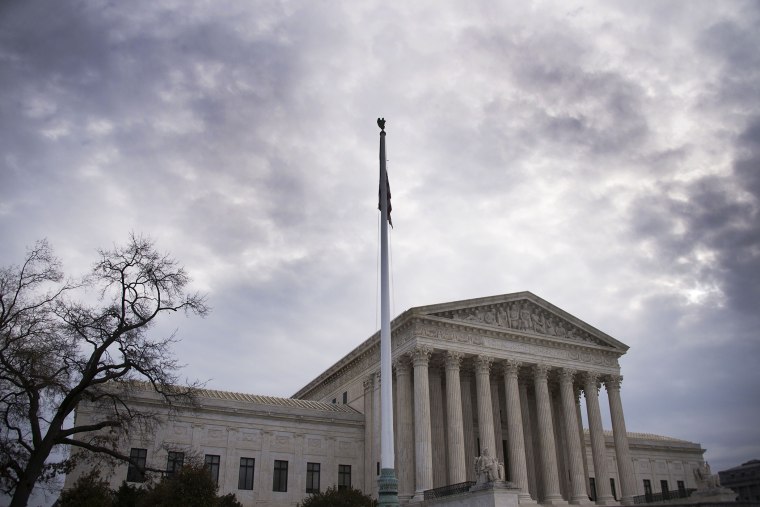About two years ago at this time, the fight over the future of the Affordable Care Act was effectively over. President Obama had won re-election; the Supreme Court had endorsed the law's constitutionality; Republican leaders were referring to "Obamacare" as "the law of the land"; GOP governors were grudgingly accepting Medicaid expansion; and systemic improvements were taking root.
For all intents and purposes, the debate over health care reform had been settled. The ACA had won and the nation was benefiting as a result.
But as it turns out, anti-health care forces had one last Hail Mary pass left to throw, and as Suzy Khimm explained, it lands at the Supreme Court today.
The Supreme Court will hear a case on Wednesday that could jeopardize the future of Obamacare and imperil insurance coverage for millions of Americans. [...] If the plaintiffs prevail, more than 7 million Americans in up to 37 states are expected to lose the subsidies they receive to help pay for their insurance coverage they purchases on the federal Obamacare exchanges.
The case may seem complicated, but the dispute is actually pretty straightforward.
Under "Obamacare," insurers compete for consumers' business, offering a menu of health care plans in a marketplace called an "exchange." Americans choose the plan that works best for them, and as part of the system, most consumers get a subsidy through the ACA to help make the insurance more affordable. The less someone makes, the bigger the subsidy.
Some states created their own marketplaces, but most chose not to, sending consumers to healthcare.gov, which served as a national exchange. By design, the practical difference is irrelevant -- everyone gets the subsidy, whether they enroll for coverage through a state marketplace or the national one.
And that's where the trouble starts. According to those who want to tear down the ACA, there's half of a sentence buried in the lengthy reform law that might suggest, when wrenched from context, that subsidies are only intended for those who sign up through a state exchange. Every family that has coverage through healthcare.gov, they argue, should get nothing because the law says subsidies go to those who purchase a plan through an "exchange established by the state."
So, tough break for 7 million people? The letter of the law must be followed as written? Actually, no. In American jurisprudence, as even the most right-wing justices have said many times, laws aren't interpreted by isolating a phrase out of context. The totality of the Affordable Care Act makes clear that all consumers are eligible for subsidies, and literally everyone involved in the process -- Democrats, Republicans, journalists, staffers, judges, everyone -- is well aware of the fact that this was the intent of the law. Indeed, the ACA is being implemented exactly this way right now.
ACA critics know this, of course, so they had to take their argument to the next level -- they're also arguing that those who wrote Obamacare intended to deny subsidies to everyone who was covered through healthcare.gov. It was part of a secret scheme, these far-right activists argue, to compel states to create their own exchange.
This argument, of course, is a brazenly insane fraud. We know what the ACA architects intended because they're all still around telling us exactly what they intended.
To this extent, when oral arguments begin later this morning on King v. Burwell, it will be the easiest case the Supreme Court has ever heard -- the plaintiffs' case is demonstrably ridiculous.
So why are ACA proponents panicking? Because the fear is that the Republican justices on the Supreme Court cannot be counted on to be fair-minded judges. Health care proponents believe there's a real possibility that the Republican justices are so hostile to the Affordable Care Act that they'll cling to any pretense, no matter how blisteringly stupid, simply to derail a law they hate.
There's no shortage of questions that will come into focus today, but among them is a genuinely uncomfortable inquiry: do the high court's GOP appointees see themselves as judges or partisan activists?
If it's the latter, millions of families will lose their subsidies, which means they'll no longer be able to afford insurance, which means they'll withdraw from the system, which means the pool of consumers will shrink the market, which means a "death spiral" may kick in unraveling much of the American health care system -- all because five Republican judges decided to ignore context, history, and the law.
Brian Beutler added this morning, "[T]he crucial elements of the King case -- the political theatrics, the enlistment of plaintiffs, the historical revisions, the legal arguments themselves -- are all breathtaking in their duplicity." And that, in a nutshell, is why this case is an embarrassment.
Whether or not the Supreme Court majority cares will become clearer in a few hours.
Update: It's worth remembering that the 4th Circuit Court of Appeals, in a unanimous ruling, rejected the anti-health care argument as ridiculous. Judge Roger Gregory wrote that the plaintiffs could not “rely on our help to deny to millions of Americans desperately-needed health insurance through a tortured, nonsensical construction of a federal statute whose manifest purpose, as revealed by the wholeness and coherence of its text and structure, could not be more clear.” The question today is whether Roberts, Kennedy, Alito, Scalia, and Thomas care enough about their reputations and the integrity of their institution to agree.
